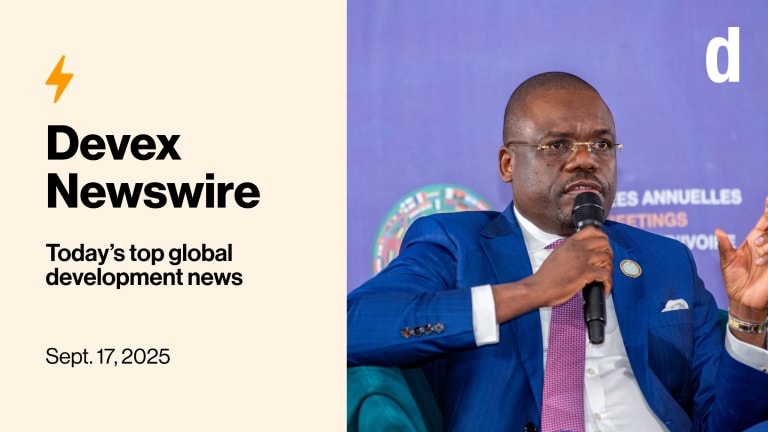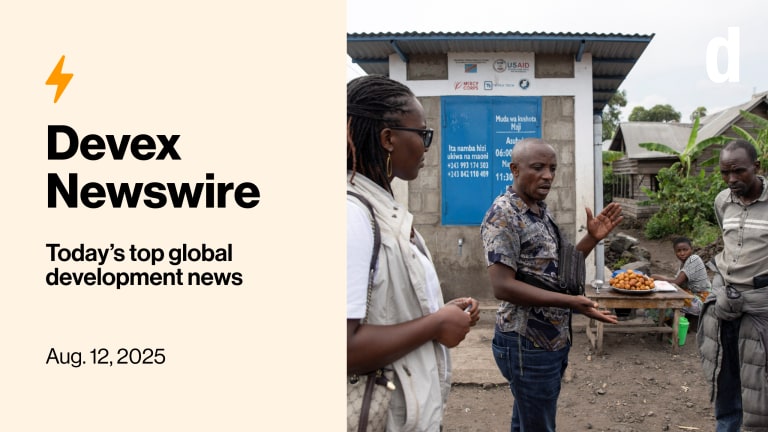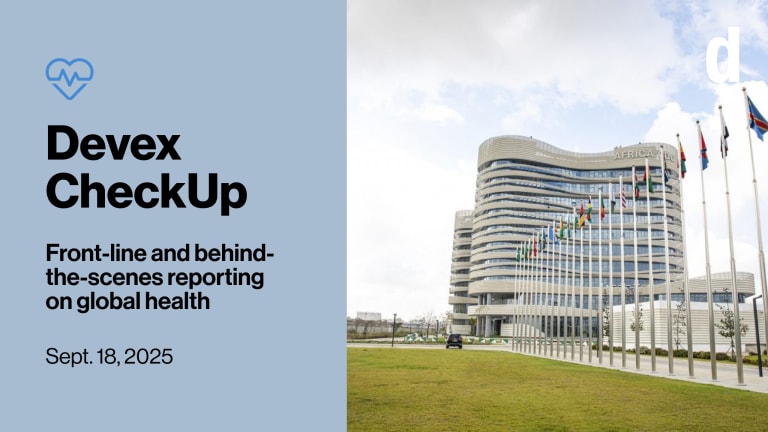Devex Newswire: Africa’s health authority turf wars
In today's edition: WHO and Africa CDC commit to working more cooperatively, Pakistan’s latest IMF deal, and what's the right rate of paying overhead in development?
The World Health Organization and Africa CDC are getting their houses in order and working together to reduce the inefficiencies caused by sometimes running parallel operations. We take an in-depth look at the friction and mixed messages caused by the two organizations’ history of inadequate communication. Also in today’s edition: Does USAID pay too much in overhead costs? And CARE International UK faces troubling times. + Register now for Devex Pro week. From July 10-14, we’ll be hosting events and deep dives into topics including how AI will change development, how to do philanthropy better, the Bridgetown Agenda, the new generation of philanthropists, and more — exclusively for Pro members. We’re offering new Pro members $100 off an annual membership — sign up by July 21. An unhealthy mess Big bureaucracies always create waste and inefficiency; it’s inevitable. Now the overlapping remit of two major health authorities appears to have led to turf wars and mixed messages. For decades, WHO has responded to Africa’s health emergencies. Then in 2017, the African Centres for Disease Control and Prevention was launched to give nations better control over the health of their populations and ensure continental collaboration. Africa has over 100 public health emergencies each year, including climate-induced diseases and humanitarian crises. Individual governments are expected to lead health responses, with WHO and Africa CDC in supporting roles. But having two players in the same space has at times created friction: When a country needs health supplies, for example, it sends requests to both WHO and Africa CDC, then waits to see who sends supplies first. Supplies arriving second often go to waste or are put into stockpiles. At times the two organizations even publish guidelines that contradict each other. Now, encouraged by funders and African governments, WHO and Africa CDC have agreed to turn things around and commit to working more cooperatively and with better communication, writes Sara Jerving. They have entered into a five-year Joint Emergency Preparedness and Response Action Plan. “Every day, we should work on continuing that communication and building that trust — like a marriage,” Dr. Abdou Salam Gueye, regional emergency director at WHO Africa, tells Sara. “If we don't do it right — and if we don't do it together, we will not take the continent to the next level,” adds Dr. Merawi Aragaw Tegegne of Africa CDC. “The key message is not about Africa CDC or WHO, it’s about how Africa is coming together.” Read: WHO and Africa CDC work to mend their fractured relationship CARE bears stares CARE International UK, which fights poverty and social injustice globally, is facing some difficulties. There is “material uncertainty” over whether the NGO is still a “going concern” – i.e., financially stable enough to guarantee its future operation, according to its trustees. Accounts for the fiscal year to June 2021 — published 426 days late — show the charity had revenue of £62.7 million, down 15% from the previous year, which it blamed on U.K. government aid cuts. In 2020 and 2021, CARE received a little over 71% of its income from the Foreign, Commonwealth & Development Office, making it unusually dependent on the government for income compared to other U.K. charities. That makes it particularly vulnerable to policy changes, writes David Ainsworth. Although this is the second straight year CARE’s accounts have contained “material uncertainty” warnings, and numbers for the year to June 2022 are already 66 days late as of this writing, a CARE spokesperson denied there are any real problems. “These statements have had no bearing on CARE International UK’s ability to carry out its work.” Read: Major UK NGO faces 'uncertainty' over future after FCDO cuts Overcharging overheads Is the U.S. getting bilked on USAID overhead costs? Some Republican lawmakers seem to think so. They reckon suppliers pad their funding proposals with unnecessary admin costs, and the government is paying over the odds. And if you look at the numbers, it’s easy to see why they might think that. USAID often pays a quarter of project costs as overhead. The European Union and United Nations agencies, on the other hand, pay just 7% of project costs, and big philanthropic foundations such as the Bill & Melinda Gates Foundation have typically paid around 15%, writes David. But sector representatives offer a simple answer: USAID’s rates are probably closer to the true cost of overhead, and other funders are underpaying. Funders’ failure to properly pay overhead, they say, means development organizations end up either concealing it in project costs, subsidizing government expenditure from other funds, or cutting important expenditures to balance the books. And by putting pressure on overheads, those funders are preventing grantees from building skills, maintaining proper reserves, and properly managing risks such as data breaches and fraud, making them less efficient in the long term — a concept known as the starvation cycle. So should funders really try to spend less overhead, David asks — or should they spend more? Read: Are US lawmakers right to challenge USAID overhead spending? (Pro) + Devex Pro members can get the most out of our USAID coverage. Not a Pro member yet? Get $100 off membership and a 15-day free trial. Pakistan bailout The International Monetary Fund board is expected to approve a $3 billion bailout deal for Pakistan this month. IMF staff said the country is reeling from a mix of issues, including "policy missteps" and the fallout from devastating floods and the war in Ukraine, my colleague Shabtai Gold tells me. The deal should give Pakistan some breathing space — but it still needs more capital inflows, including from multilateral institutions, foreign firms, and private investors, to get its stalled economy growing again amid intense political infighting. The country's inflation rate clocked in at nearly 38% earlier this year, though it has since moderated. The government, which has hefty debt loads, will have to use the IMF deal — its 23rd — to attract investors, and for that, it needs to enact reforms. Related: Inside Pakistan's troubles with its latest IMF deal In other news The United Kingdom denies any plans to drop its flagship climate pledge after a leaked note revealed the British government might have to allocate 83% of its foreign aid budget to meet the £11.6 billion pledge. [The Guardian and Reuters] Thousands of Afghan asylum seekers in the U.K. who fled the Taliban are facing eviction from government-paid hotels following the government’s decision to cut support by end of August. The majority won't be offered a place to live due to a housing shortage in the U.K. [The Independent] Russia insists on its demand to reconnect its state agricultural bank to the global SWIFT payments system to prevent the collapse of the Black Sea grain deal, which is set to expire on July 17. [Reuters] Sign up to Newswire for an inside look at the biggest stories in global development.
The World Health Organization and Africa CDC are getting their houses in order and working together to reduce the inefficiencies caused by sometimes running parallel operations. We take an in-depth look at the friction and mixed messages caused by the two organizations’ history of inadequate communication.
Also in today’s edition: Does USAID pay too much in overhead costs? And CARE International UK faces troubling times.
+ Register now for Devex Pro week. From July 10-14, we’ll be hosting events and deep dives into topics including how AI will change development, how to do philanthropy better, the Bridgetown Agenda, the new generation of philanthropists, and more — exclusively for Pro members. We’re offering new Pro members $100 off an annual membership — sign up by July 21.
This article is free to read - just register or sign in
Access news, newsletters, events and more.
Join usSign inPrinting articles to share with others is a breach of our terms and conditions and copyright policy. Please use the sharing options on the left side of the article. Devex Pro members may share up to 10 articles per month using the Pro share tool ( ).
Helen is an award-winning journalist and Senior Editor at Devex, where she edits coverage on global development in the Americas. Based in Colombia, she previously covered war, politics, financial markets, and general news for Reuters, where she headed the bureau, and for Bloomberg in Colombia and Argentina, where she witnessed the financial meltdown. She started her career in London as a reporter for Euromoney Publications before moving to Hong Kong to work for a daily newspaper.




